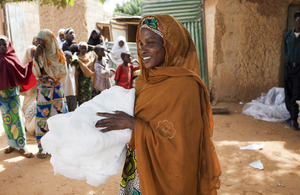UK aid committed to prevent deaths from Malaria in Africa
UK support in Mozambique leads to 40% fall in malaria related deaths. Further 5 million bed nets to be distributed in Uganda.

A woman carries a bednet collected from a distribution point in Kano, Nigeria. Picture: Malaria Consortium/Benoist Carpentier
DFID efforts to tackle malaria in Mozambique has led to areas which received funding for indoor residual spraying seeing a dramatic reduction in deaths and hospital admissions of at least 40%. In 2012/13 UK aid supported indoor residual spraying (IRS) through UNICEF in 39 districts, protecting 5.8 million people from malaria.
Scaling up work in bed net distribution, the UK will be providing 5 million bed nets to Uganda, to ensure that the families across the country have access to insecticide-treated nets. Malaria remains one of the greatest public health problems in Uganda and has one of the highest (45%) prevalence rates of malaria in children in the world.
Justine Greening, Secretary of State for International Development, said:
“Africa sees a child die every minute from malaria and this terrible disease is estimated to cost the African economy $12 billion. We need to do everything we can to break the cycle of this disease so that countries can develop their economies and support themselves.
“In Mozambique UK support has already led to a 40% fall in malaria related deaths and hospital admissions in areas we support. And the 5 million treated bed nets we are providing to Ugandan families will help to dramatically reduce the number of deaths caused by malaria.”
Malaria is a preventable and treatable disease. Yet more than half of the world’s population is at risk of malaria, nearly 250 million people become severely ill with it each year and approximately 655,000 people die from malaria each year.
Treating malaria is a UK government priority and we are committed to helping halve malaria deaths in at least 10 high-burden countries by 2015. DFID has scaled up its support since 2010 with a focus on the poor and vulnerable populations in high-burden countries in Africa and Asia.